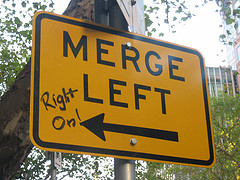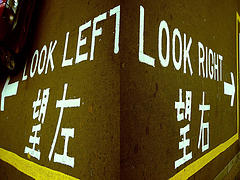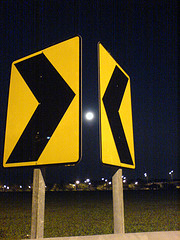Honton ko si kar dekhiye pachtaiye ga aap
Hangame jaag uthte hain aksar ghuttan ke baad
 Any anodyne effect this sher might have had on me was lost forever when my neo-Trotskyite friend decided to give me his interpretation of it. I didn’t ask for it, but there it was. A multi-headed hydra called “having coffee†– where the conversation starts off polite, turns to prittle-prattle , turns to poetry, turns to politics, turns to polemics, turns to punches. Lucky for me, he hits like a girl.
Any anodyne effect this sher might have had on me was lost forever when my neo-Trotskyite friend decided to give me his interpretation of it. I didn’t ask for it, but there it was. A multi-headed hydra called “having coffee†– where the conversation starts off polite, turns to prittle-prattle , turns to poetry, turns to politics, turns to polemics, turns to punches. Lucky for me, he hits like a girl.
“Religious extremism is the new communism,â€
he hissed, spraying spittle in all directions. I laughed. He carried on, unperturbed but passionate:
“The poor man has found his outlet – the injustice, the exploitation, the degradation, the desperation he’s suffered has found its expression. Islam, like communism, is based on egalitarian principles and promises them justice and equality. You think religious extremism has got anything to do with religion? It is nothing but the collective voice of a people who’ve been wronged their whole lives.â€
Somehow this gave me goose bumps and I quickly gulped down the latte in hope of thawing the chill his words left. It didn’t work and I got to thinking about Pakistan and Pakistanis everywhere.
Religious extremists in Pakistan can come from all walks of life but a sizeable chunk belongs to the poorer section of the society. Pakistani immigrants and expatriates living in the West also make up a significant portion. Why are these two groups more prone to religious extremism and terrorism? Was it that, time and again, they were discriminated against and shunted to silence? Did the exclusion leave such bitterness that it got bottled up inside for so long – so long that it is now, quite literally, exploding?
 In Pakistan’s context, the implication that religious extremism is connected to poverty and disfranchisement has been made not with a bang but a whimper (pun unintended). I think this concept needs to be forced to the fore. Many in the corridors of power are finding it convenient to ignore the ‘real’ reasons leading to Islamic radicalism, as that may point the j’accuse finger in their direction. But let’s briefly look at why a 19 year old Pakistani boy picks up a Kalashnikov or why a 37 year old father of three straps explosives around his waist.
In Pakistan’s context, the implication that religious extremism is connected to poverty and disfranchisement has been made not with a bang but a whimper (pun unintended). I think this concept needs to be forced to the fore. Many in the corridors of power are finding it convenient to ignore the ‘real’ reasons leading to Islamic radicalism, as that may point the j’accuse finger in their direction. But let’s briefly look at why a 19 year old Pakistani boy picks up a Kalashnikov or why a 37 year old father of three straps explosives around his waist.
It’s no secret that democratic institutions in Pakistan are in a frail state, if at all alive.
And then there is no Left or not much left of it. (The Communist Party of India could arguably be a good example of the importance of such a “balance of power†– on the domestic front at least.) In Pakistan very few avenues are open to the poor in need of some succour or just in need of voicing their distress. So, what happens? Under a dictatorship, and with no diversity of political parties to choose from, the poor, frustrated man turns to the radical Right – the Mullahs and their might.
Pakistani religious extremists living in the West dance to a slightly different tune. Feeling discriminated, displaced, alienated or plain confused – they crave to cling to a core, something that will anchor their sense of identity. Often times this comes in the form of religion. Sometimes its taken to an extreme. So, the religious radical turns to radicalism not out of a love for religion, but a deep hatred for those elements that he felt were unjust towards him (or his brethren.) Anti-Western sentiments do not transpire from Koranic verses, instead they’re born of the experiences one had in/of the West and the bitter taste that can leave in one’s mouth… body and soul.
 This is important. Scholars like Nichole Argo have accentuated the point: emotional and social ties precede the acquisition of ideology. Either our social situation has to be in the doldrums or our emotional condition so wounded that we take a religious ideology to an extreme. The media almost always portrays the religious extremist or terrorist as a gun-slinging gung-ho Islamist with a medieval mind and beard to boot. He is a dangerous, diehard jihadi on a mission to kill or be martyred trying. Such a description is like a donut-truth; the truth, the whole truth, with a hole in the truth (I forget what film this line is from). That hole is the real reasons people are pushed to accept a radicalised Islam, and these reason need to be better understood if we sincerely hope to curb extremism. Half-measures – like madrassa reformation – being implemented by our marginal-satisfiers might prove productive in that they’re broadening the narrow teachings of many religious seminaries. But they’re not preventing extremism. People, especially the poor and alienated, will continue to feel helpless in the face of a system they despise but can’t do anything to change. In fact, they may feel, and most do, that the measures being taken to tackle extremism are the spawn of the West, the very demon they wish to slay. So, they will continue feeling dejected and cheated. This inadvertently leads to the shift in their psyche that paves way for an extremist view.
This is important. Scholars like Nichole Argo have accentuated the point: emotional and social ties precede the acquisition of ideology. Either our social situation has to be in the doldrums or our emotional condition so wounded that we take a religious ideology to an extreme. The media almost always portrays the religious extremist or terrorist as a gun-slinging gung-ho Islamist with a medieval mind and beard to boot. He is a dangerous, diehard jihadi on a mission to kill or be martyred trying. Such a description is like a donut-truth; the truth, the whole truth, with a hole in the truth (I forget what film this line is from). That hole is the real reasons people are pushed to accept a radicalised Islam, and these reason need to be better understood if we sincerely hope to curb extremism. Half-measures – like madrassa reformation – being implemented by our marginal-satisfiers might prove productive in that they’re broadening the narrow teachings of many religious seminaries. But they’re not preventing extremism. People, especially the poor and alienated, will continue to feel helpless in the face of a system they despise but can’t do anything to change. In fact, they may feel, and most do, that the measures being taken to tackle extremism are the spawn of the West, the very demon they wish to slay. So, they will continue feeling dejected and cheated. This inadvertently leads to the shift in their psyche that paves way for an extremist view.
Some extremists may genuinely be harbouring a twisted interpretation of religion, and others may just be twisted by nature. But I believe that for most the acquisition of a radical religious ideology is triggered from a more fundamental feeling of victimisation, of feeling wronged, and/or being part of a harshly unjust system. In such cases religion offers unction, and a bandwagon-effect ensues whereby millions of disempowered and discriminated find a mouthpiece and meaning in the Right. Ironically, the factors thrusting them to the extreme right is born of leftist logic; an anti-establishment egalitarian cry for equal rights for the common citizen.
(How corrupt leaders exploit this feeling in the masses to further their own political interests is another matter. Also I would like to advise everyone to not turn this into a debate about Islam. It is about how the basic wrongs in society which cause an individual to adopt an extremist view, and how it is these wrongs that need to be focused if we wish to break free from the vicious cycle of militancy and dictatorship.)
Photo Credits: Flickr.com


















































Thank you everyone for your comments, and a special gratitude for those who stuck to the point.
For the gentleman who praised this article for being the work of a 15 year old: without realizing it you expounded on all my points and left this kid with little room for a rebuttal. We are in complete agreement, you and I. You just made the jejune mistake of thinking I would use Left in the most narrowest sense of the word.
Reza Rumi, I see your point, but, unless someone here agrees to fund my PhD on the subject, its difficult to not make ‘generalisations’. Most of what I’ve said is based on a bit of research however, as well as observation. The re-born Muslim cricketers/musicians etc wouldn’t fall under the rubric of ‘extremists’, as per my definition. (Not even the Lal Masjid crowd for that matter.) They’re not learning how to become a fedayeen in militant training camps or hurling grenades in to open markets or mosques under the banner of Deobandi Islam etc. I was referring to suicide-bombers or those who embrace the violent side of ‘jihad’.
Omar Sheikh, the LSE-graduate, apparantly was moved by the plight of Muslims in Bosnia, Chechnya etc and that paved way for his radical religious approach. I think that that kind of emotional residue, left by experiencing injustice around you, is the potent ingredient that can lead to extremism. Islam can offer a way to vent that anger, or to explode even. (Of course it isn’t just Islam, people have killed and gotten killed in the name of other religions too.)
Couple this with a threat of a spreading neoliberal world order, and no Soviet Union to bipolarise your interests, I can almost empathise with the man who turns to radical Islam as a means of resistance against this ‘westernization’. So, whoever thought I was parrotting a western viewpoint in this article needs to read it more carefully. If anything I’m trying to understand the terrorist within a social context, which I doubt the western media is interested in doing at this stage.
Its a vast topic and could be debated endlessly. I just think it is important not to forget other, perhaps more accurate, explanations for religious extremism. Especially at a time when terrorists, imaginary or otherwise, are being rooted out as bad seeds in an otherwise harmonious system. It could be that the system itself has sown these seeds. Be it Mush’s despotism, or Bush’s imperialism.
Ms. Qandeel Shaam:
I find your article very interesting and thought provoking. I blame Pakistani Middle classes and particularly the Upper Middle class for much of our problems. This class, in its present form, comprises of self-absorbed and self-preserving individuals that have failed to meet their social obligations and responsibilities. Instead of helping out our less fortunate and poor, and demanding for their rights, this class is busy safeguarding only its own interests. The result is a growing economic gap between ‘haves’ and ‘have-nots’ which ultimately leads to social unrest and lawlessness. Extremism, religious or otherwise, is a manifestation of this economic disparity between the classes. When did the members of our Middle classes step out of their own circle and try to find out what ails the society. Look at the present ‘throw Musharraf out’ campaign. Other than shouting ‘go Musharraf go’, what little else is that our Upper Middle class is demanding? Where are the voices speaking for social justice, clean drinking water, universal health care, and, free and compulsory uniform education for all. As long as we are able to send our own kids to LSE & LUMS who cares what happens to the kids of the poor cart puller. With attitudes like that do we have right to complain about the extremism in our society?
reminds me of that old rhyme we used to sing as kids:
left right left right
paijama dheela topi tight
btw chirand, you may be right about buddhist monks not blowing themselves up in burma, but they routinely do so in sri lanka. and last i checked, the large majority of l.t.t.e. (tamil tiger) suicide bombers have been non-muslim.
@rafay kashmiri: let the ants out of your pants, my friend. my objective was to compare the lure of communism (or the *traditional* left) in pakistan with the much much stronger pull of islam. not to complain about the sound of the azaan which, despite the fact that i don’t pray, can be one of the most uplifting sounds (when performed by a mellifluous voice).
Correction
Two in the second line should be read few.
I think it would be very interesting to explore and understand this phenomenon of religious extremism. Two events of recent past might explain this
. Disorientation of Left following the disintegration of USSR and so called Globalization.
Emergence of multi-national corporations in third world markets, and explosion of mass media which were perceived as insensitive to the sensibilities of local culture.
Vast majority of people were not equipped with the tools to participate in globalization for being poor and illiterate.
Tiny minority of urban educated middle class benefited from these new trends, This created a huge disparity between haves and have-nots.